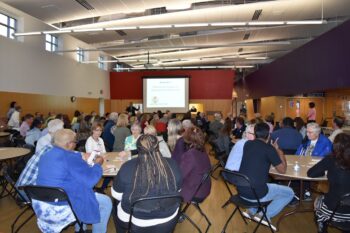By Kayla Zopfi
The concept of “public church” encapsulates the sentiment that the followers of Christ ought to engage as communities of faithfulness outside the walls of the church building. The ELCA website on page titled “Called to be a Public Church” states “Our Christian faith compels us to attend to the world through the lens of our relationship to God and to one another. As a public church, we have a responsibility to step outside our comfort zones and challenge ourselves to address issues that affect families, communities and neighbors throughout the world.”

Hopkins residents, including members of Gethsamene Lutheran, gather to talk about how to be a more welcoming community.
Gethsemane Lutheran Church in Hopkins has been working to embody just what it means to step outside its comfort zone and address important, timely issues affecting its community.
In 2015, following the murder of Philando Castile, Pastor Sarah Moat was continuing to plan the summer Community Conversation series she had been championing. Pastor John Nelson forwarded an idea to her which he was given while working as a volunteer police chaplain: host a community conversation on the topic, “Why is it so difficult to talk about race?” Pastor Sarah agreed, and the date was set.
When about 60% of the participants who showed up on the day of the event were community members, and around 40% were members of the Gethsemane congregation, both Pastor Sarah and Pastor John knew that they were being called into the work of public church.
“THE HOPKINS RACE AND Equity Initiative (HREI) is a collaborative effort creating opportunities to increase awareness and understanding of race, equity, and diversity and promoting a sense of community that welcomes and values all residents,” according to the group’s mission statement. The nonprofit organization came together after months of planning, with much credit given to Pastor John’s leadership.
This group brings together three main constituencies – the city of Hopkins, including representatives from the Hopkins Police Department; Hopkins Public Schools; and Gethsemane Lutheran Church – as liaisons of the broader community. These groups were seen as having strong and direct involvement in shaping the experiences of community and race in Hopkins.
The praxis of the HREI’s work takes place under two main umbrellas. First, to focus on community-building and education, the group hosts two community conversations a year, both on topics which use a lens of intersectionality. These events have typically ranged anywhere from 150 to 600 participants throughout the years.
“The Hopkins Race and Equity Initiative brings together three main constituencies – the city of Hopkins, including representatives from the Hopkins Police Department; Hopkins Public Schools; and Gethsemane Lutheran Church – as liaisons of the broader community.”
Secondly, it focuses on institutional reform. To accomplish this goal, they bring together city managers, police chiefs, superintendents, and diversity equity and inclusion directors from the cities of Edina, St. Louis Park, Minnetonka, Eden Prairie, and Golden Valley for a yearly leadership summit centering around creating change within their organizations and communities.
“You can pray for justice, or you can go and change unjust systems,” Pastor John responded when asked why it is important to him that Gethsemane is involved in the public sphere.
SINCE THE HREI’s inception, Gethsemane members have been overwhelmingly supportive of the group and of their congregation engaging in conversation about topics that many other Christians believe the church should not address. Internally the congregation has been making efforts to engage in these conversations, which their current theme of worship, “Building a Welcoming Table,” illustrates. In the broader community, members are also doing important work.
 “[Gethsemane] really shows up, they are very good community partners. And I think that strong partnerships is why this work has been successful,” says Hopkin Assistant City Manager and HREI member Ari Lenz. She continues, “I’m grateful that John’s congregation has chosen to continue to prioritize this work with both Pastor Sarah’s and Pastor John’s time, as well as [conributing] financially.”
“[Gethsemane] really shows up, they are very good community partners. And I think that strong partnerships is why this work has been successful,” says Hopkin Assistant City Manager and HREI member Ari Lenz. She continues, “I’m grateful that John’s congregation has chosen to continue to prioritize this work with both Pastor Sarah’s and Pastor John’s time, as well as [conributing] financially.”
“To focus on community-building and education, the group hosts two community conversations a year.”
Donna Anderson, who has volunteered as Gethsemane’s Social Ministries Chair since the early 1990s, has been deeply invested in ensuring the congregation’s commitment to its community. She hopes that the HREI is sustainable and can expand the educational and anti-racism work that has been facilitated in the past seven years. She says that she hopes “Gethsemane continues being a part of the HREI, and through both that vehicle and our own vehicle [as a church], we keep having these conversations and building welcoming tables.”
Gethsemane is leaning into the call to attend to the world through the lens of its members’ relationship to God and to one another. They are following the example of Jesus, and they plan to continue to do so. They will continue even when divisive, even when hard questions arise, and especially when the worth and value of our siblings in Christ is disparaged.

